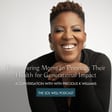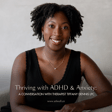
Understanding Eating Disorders: A Conversation with Dr. Tiffany Loggins
In this episode, we delve into the world of eating disorders with clinical psychologist Dr. Tiffany Loggins. We explore the signs, symptoms, and risk factors, while debunking common myths. Our guest will also discuss treatment approaches, the importance of self-compassion during recovery, and how to develop a healthy body image.
What You'll Learn:
- Common types of eating disorders and their signs & symptoms
- Risk factors that can contribute to eating disorders
- Dispelling myths and misconceptions surrounding eating disorders
- How a clinical psychologist works with individuals struggling with eating disorders
- Different treatment approaches for eating disorders
- The importance of a personalized treatment plan
- Challenges and setbacks during the recovery process from an eating disorder
- Tips for maintaining motivation and self-compassion throughout recovery
- Building a strong support system for people with eating disorders
- The complex relationship between eating disorders and body image issues
- Strategies for developing a healthier body image and promoting self-acceptance
This episode is for you if:
- You're concerned about yourself or a loved one who might be struggling with an eating disorder.
- You want to learn more about the signs and symptoms of eating disorders.
- You're curious about treatment approaches and the recovery process.
- You'd like to understand the importance of body image and self-esteem in eating disorder recovery.
Dr. Tiffany Loggins, Psy.D. is a culturally sensitive, licensed clinical psychologist, author, and mental health and wellness speaker in San Francisco. She specializes in working with diverse communities of color and holistic approaches to helping individuals live in alignment with their authentic selves. She also has specialized training working with individuals struggling with severe mental health conditions and eating disorders. Given her clinical background serving individuals with a wide variety of settings including universities, hospitals, and community-based mental health settings, she also simultaneously utilizes both a multicultural framework and evidenced-based approaches to help individuals illuminate new insights that accompany feelings of direction, purpose, and passion.
She currently has a private practice in San Francisco, CA called Discover the Authentic Self, where she provides virtual individual, group, and couples therapy to help others in their process of transformation and resilience. She believes therapy is not a one-size fits all, rather she focuses on mutual collaboration to create a unique approach catered to everyone, as one should be the author of their own journey to healing and growth. She also has published a self-help workbook, Essential Tools for Cognitive Behavioral Therapy that is available for purchase on Amazon. It is a user-friendly resource that can help guide individuals on their self-healing journey or is also beneficial for therapists, as it provides evidence-based techniques and coping skills to manage an array of common clinical issues including depression, anxiety, anger management, sleep, self-esteem, OCD, PTSD, and eating disorder.
Resources: Essential Tools for Cognitive Behavioral Therapy
You can also book a free 15–30-minute phone consultation or learn more information about scheduling a talk or a workshop at https://www.tiffanyloggins.com/
For more information on Dr. Tiffany visit https://linktr.ee/drtiffanynicole
Want to be a guest on the pod? Email us at podcast@solwell.co





![Life after [baby] loss A conversation with Alishia Anderson image](https://media.zencastr.com/cdn-cgi/image/width=112,quality=85/image-files/61fb5028559b7100aee9f217/492cabf0-4479-488c-b19c-2873fe6bdce8.png)













